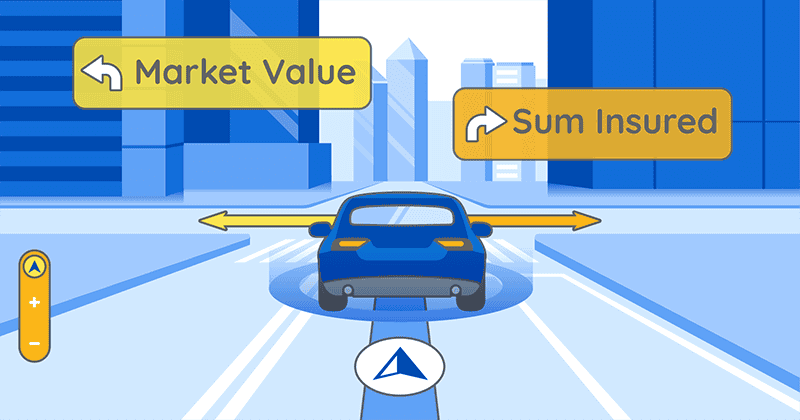Insuring your Car on Market Value vs Sum Insured

For most of us when we purchase comprehensive car insurance, the basis of coverage for our car is typically determined by its “Market Value”. But sometimes, you notice that the quotation you received indicates “Sum Insured”. Your choice of policy will impact the amount of the insurance pay-out should you file a claim for theft or total loss.
What is market value car insurance?
Market value car insurance is the standard method for valuing a car. Your insurance provider will use the information they have about your vehicle to estimate its likely value in the current market when it's declared a total loss.
To determine the market value, insurers typically look at prices of vehicles on the open market that are the same as or similar to yours in terms of make and model. They calculate an average price based on these comparable vehicles. The market value is determined using a mix of sources, such as online platforms like SGcarmart, as well as insights from motor surveyors.
The premiums for market value car insurance policies are often lower than those for policies that insure your car for a specific "Sum Insured." However, there is a degree of uncertainty regarding the exact compensation you would receive from your insurer if your car is written off. If you disagree with the amount assigned by your insurer for your vehicle's worth, you can discuss the matter with the insurer. If the dispute escalates, you can seek resolution through the Financial Industry Disputes Resolution Centre.
What is sum insured (inclusive of PARF and COE) car insurance?
Sum insured car insurance is often offered for high-value, supercars, or rare vehicles, where the valuation may have a wider range. With sum insured insurance, you and your insurer agree on a specific value (inclusive of Preferential Additional Registration Fee (PARF) and Certificate of Entitlement (COE)) to insure your car when you take out the policy. The agreed-upon sum insured amount is pre-calculated based on your car's make, model, year, and several other factors at the time of purchase. The key advantage is that it provides certainty about the payout amount if your car is declared a total loss or stolen.
The premiums tend to be higher than insuring your car for market value. However, this option offers flexibility in determining the insured amount.
Preferential Additional Registration Fee (PARF) and Certificate of Entitlement (COE) rebates
Which is better: market value or sum insured?
The choice between market value and sum insured car insurance depends on your preferences and priorities.
Market value policies often come with lower premiums, making them a cost-effective choice. However, they may involve some uncertainty regarding payout amounts due to market fluctuations. Sum insured policies provide clarity and predictability about the payout amount, which is agreed upon at the outset. While they can be more expensive, they offer peace of mind, especially for high-value or collectible cars.
Market Value | Sum Insured |
Cheaper Option | More expensive option |
Easily available | Less available |
Valuation decreases with depreciation | Valuation is fixed and maintained |
Less clarity of total loss pay-out | Clarity of total loss pay-out |
Get insured with the right help.
Having an expert on your side to help you pick the right insurance plan and find the best price can be a big help. If you need help finding the right insurance coverage, consider working with an experienced broker like eazy. Our team can advise you on various insurance plans, including motor, health, corporate, lifestyle, and marine coverage. Speak to us today to get your insurance needs covered.